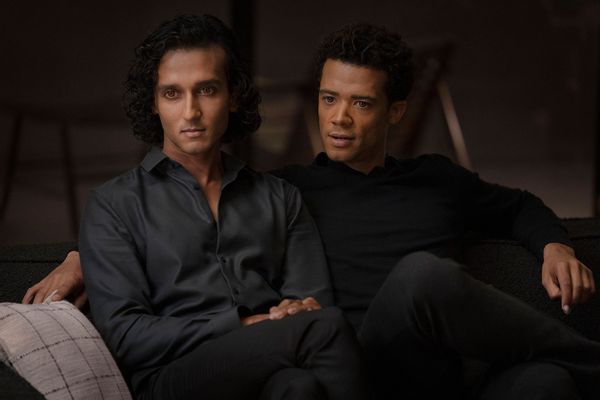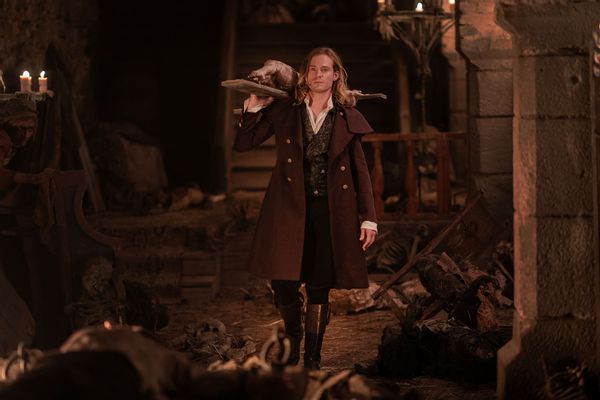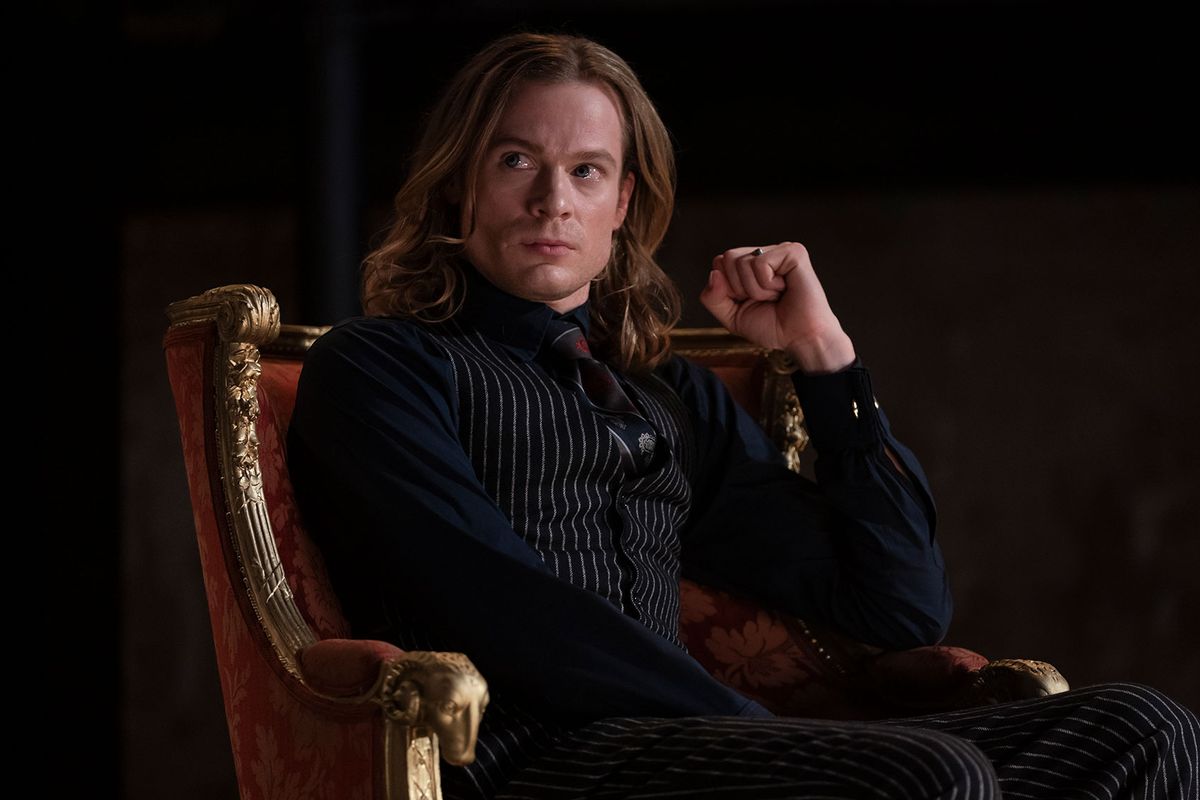Nobody throws shade like a vampire. Makes sense right? Existing forever in darkness means figuring out how to navigate and manipulate it, a talent that can rub off on the people who play these monsters.
Take “Interview with the Vampire” stars Jacob Anderson and Sam Reid, the actors bringing Louis de Pointe du Lac and Lestat de Lioncourt to life in the TV adaptation of Anne Rice’s novel. Like their immortal counterparts, these two thoroughly enjoy their work, and they especially delight in knowing their vampires go against the grain of the type of bloody romance 20- and 30-something viewers were raised with.
“I want to see crazy, demonic, messed up, tortured creatures. Like, I want to see my vampires like that, whether I’m watching this or I’m reading it,” Reid said in February, when I sat down with him and Anderson in Pasadena, Calif., to discuss the series. “I don’t want to see some glittery vampire who’s at odds with themselves and, like, can’t go near their human counterpart because they’re scared of eating them. I want to see full bloodthirst.”
Both Reid and Anderson smirked mischievously when the man behind Lestat punched down at the sparkly undead, a hint that this topic had come up before between them. Or maybe they were curious as to where the person sitting with them landed on the subject.
“Sure, OK,” I said. “Let’s talk about ‘Twilight.’” Why not? For a time in the aughts, Stephenie Meyer’s creations supplanted Rice’s among teenagers and adults harboring dreams of eternal romance and brooding lovers who could not live without them. But Louis and Lestat are the O.G.s of tainted infatuation, and the actors take pride in that.
Their working relationship informs their riveting performances, but the consideration each has for their vampire’s lot translates into a palpable yearning, or the type of regret that yawns with an unhinged jaw. Or, when talking about Lestat, an insouciant cruelty.
The third episode of Season 2, “No Pain,” continues Louis’ conversation with journalist Daniel Molloy (Eric Bogosian) as the two retrace the vampire’s past through the diaries of his companion and adopted daughter Claudia (Delainey Hayles). In the present Louis’ companion is Armand (Assad Zaman), a much older vampire who explains to Daniel how he was also Lestat’s lover for a time.
In the main, though, Armand explains the seductiveness of Lestat’s refusal to stay hidden and his insistence on flaunting his nature onstage to a Parisian audience that has no idea that the deaths in his theatrical portrayals of vampirism are quite real. Lestat is unashamed of his beauty and lethal nature, and humans are easily distracted.
“We are all anti-heroes.”
“Interview with the Vampire” was first published in 1976, and its sequel “The Vampire Lestat,” came out in 1985, spurring the series’ popularity among children of the ‘80s. That era and ours are defined by excess and the chasm between haves and have-nots, whereas the Cullens, the principled coven in Meyer’s fantasies, arrived in a decade informed by the mainstreaming of abstinence and purity rings.
Edward Cullen is the perfect gentleman, protective of Bella to a fault. Lestat is the opposite of that with Louis and Armand, whose coven’s traditions he upends by flamboyantly informing them that God doesn’t exist and is a fiction used to control them. Not long after that they and Armand join him in the footlights’ glow, feeding on the unfortunate as scores of humans applaud while witnessing a homicide.
Nevertheless, “Interview with the Vampire” is as aggressively romantic as it is brutal. A cut between two scenes illustrates that juxtaposition. In one moment someone schools Claudia in the post-World War II Paris coven’s natural means of corpse disposal and affectionately teaches her that their hungry rats love human hearts. Seconds later we watch Louis and Armand strolling by the Seine which Armand poetically describes as “contained and beautiful . . . a vein, winding through the heart of Paris.”
“Something that’s really enticing about the way that this has been adapted, but is very much a part of the books, is the idea that humans are pretty despicable,” Anderson said. “Humanity is pretty doomed in lots of ways, and it kind of always has been throughout history.”
“Interview,” he noted, is simply more honest concerning the ways that aspirational ideals perpetuated in popular culture are largely fictional.
“This show is for our generation now, as opposed to what ‘Twilight’ was back then.”
Louis, for example, might not be the tragic figure we think he is. Anderson teases that viewers still haven’t seen his character as he truly is. Maybe in Dubai, where he lives with Armand in the present as their kind is quietly setting in motion a worldwide coup of sorts. But even there, he speaks of his past from the perspective of a romanticized victim which he cautions the viewer to question as they empathize with him.
 Interview With the Vampire (AMC)
Interview With the Vampire (AMC)
“Not to say that COVID and lockdown directly inspired this show, because I can’t speak to that . . . But I think when you go through a collective trauma — and I know, obviously, everyone comes at that from a different context, it affected people differently — but I feel like maybe people just don’t really want to be fed the bulls**t,” he said.
Reid concurred. “That’s why I think this show is for our generation now, as opposed to what ‘Twilight’ was back then,” he offered. “It’s sort of like, these vampires do horrible things practically every day, but we ask you to stay with us. And we see people do horrible things all the time, every single day. And we are forced to stay with them. Which is life.
“Fortunately or unfortunately with an Anne Rice vampire, you identify with them,” Reid continued. “But that’s a different thing.”
Want a daily wrap-up of all the news and commentary Salon has to offer? Subscribe to our morning newsletter, Crash Course.
Reid’s second season Lestat is an entirely unfamiliar beast compared to the monster we met in Season 1, who seduces Louis with the promise of showing him the heights of hedonistic pleasure and the most horrific behavior imaginable.
“They’re trauma bonded, Louis and Lestat,” Reid observed, inspiring Anderson to break in with, “And Jake and Sam also trauma bonded!”
 Interview With the Vampire (AMC)
Interview With the Vampire (AMC)
“I mean, you know what you’re in for if you kind of get married with dead bodies everywhere, and brains and guts on your hands,” Reid deadpans, “so of course Louis kills him. How else are they going to end the honeymoon phase? With a murder!”
But is Lestat actually gone? In these new episodes he’s Louis’ constant companion but an imaginary one. Lestat’s figment doubles as his love’s guilty conscience and a glamorized memory. Readers know unreliable narration is the spine of “The Vampire Chronicles,” which the series interprets as Louis’ contending with a faulty memory. Every detail of his recollection must be perfect, he insists to Daniel, which is an impossible order to fulfill for anyone, including a supernatural being.
“It’s relatable. More relatable than aspirational,” Anderson explained, linking his character’s memory lapses and relative vulnerability to the show’s appeal.
“Right. We’re all well past faking it now. We’ve all been through a lot of crazy stuff,” said Reid.
“We are all anti-heroes!” Anderson declared with a playful flourish. “Unless you’re a child. Otherwise, yeah, we all have stuff.” And it is not obligated to sparkle.
“Interview with the Vampire” airs at 9 p.m. Sundays on AMC and streams on AMC+.
Read more
about this topic

